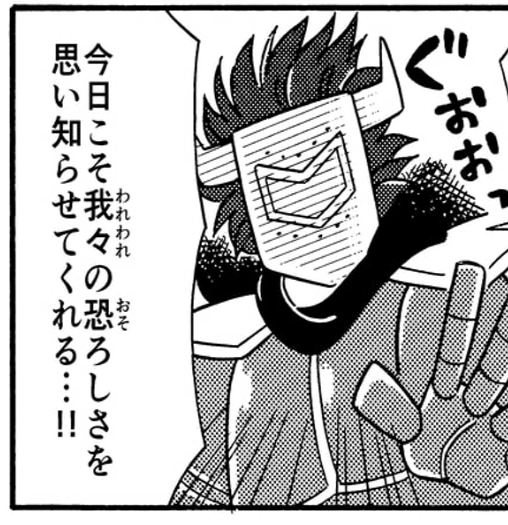What does the くれる add in this example? I know it's generally used for gratitude, but the nuance seem a little different here. Is it a sarcastic gratitude? I thought there was no sarcasm in Japanese.
-
1Related: japanese.stackexchange.com/q/40560/5010 / japanese.stackexchange.com/q/52662/5010– narutoCommented Jul 5, 2021 at 6:02
-
㋑こちらが、相手に不利益になるようなことを与えることを表す。– Jimmy YangCommented Jul 5, 2021 at 6:21
-
@naruto Any reason you reopened? I think it's fair to say it's a duplicate.– SimonCommented Jul 5, 2021 at 7:09
-
1This picture explains the usage of this type of くれる very well, so I thought closing this too soon might be not good. Basically, this ~してくれる is an old-fashioned, arrogant and very pompous way of ~してやる.– narutoCommented Jul 6, 2021 at 0:33
1 Answer
I thought there was no sarcasm in Japanese
lol.
Anyway, this くれる is shortened from くれてやる, which is strong way of saying "あげる", so in this case that sentence is translated to "Today is the day I'm going to show you how horrible we are!"(I'm not sure if this is proper translation).
Note that あげる is used for any circumstances but くれる is mostly only used in a bad way, such as when you act in a way that is detrimental to someone else(as @Jimmy Yang pointed out in comment.).
Side note: Those only applies when you(or someone) is doing/acting something. When you are giving or receiving a thing, くれる does not mean to be bad. e.g. 彼が持ってきてくれるそうだ is often used when someone is bringing something to you, there's no bad meaning.
-
1Here they talk about やってくれる, is it the same as くれてやる?japanese.stackexchange.com/questions/938/…– SimonCommented Jul 5, 2021 at 6:57
-
I don't think I've ever heard of that use of やってくれる, it'd be やってやる or something, I guess? But most of time when you say something like this, you usually say "~くれる"(as original image said) or, in a more difficult(and old-fashioned) way, "してくれようぞ".– Skye-ATCommented Jul 5, 2021 at 7:07
-
1So, forgot to mention that "やってくれたな" is used in the perfect tense, and when someone has done something to your detriment, rather than you doing something.– Skye-ATCommented Jul 5, 2021 at 7:09

